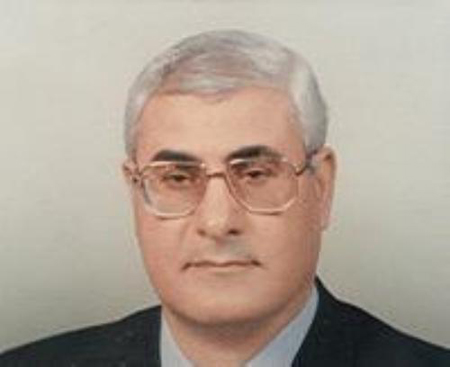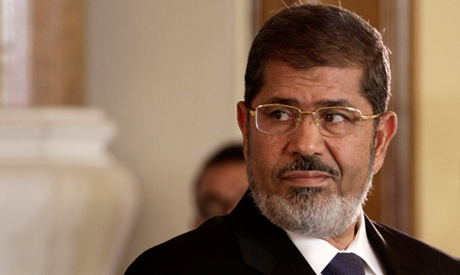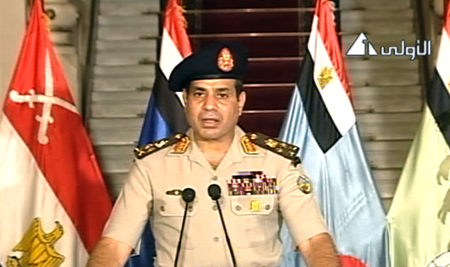Revolution part 2: The fall of Mohamed Morsi
In response to millions of Egyptians taking to streets, army and number
of political and religious leaders propose roadmap aimed at ending year
of unrest
Mary Mourad, Wednesday 3 Jul 2013
Today's milestone marks a new phase in the Egyptian revolution, one
which many had awaited since Mubarak stepped down in February 2011. The
statement, read out by military chief-of-staff Abdel-Fattah El-Sisi,
describes a roadmap that includes the ousting of President Mohamed Morsi
of the Muslim Brotherhood, suspending the constitution temporarily, and
handing over power to the head of Egypt's High Constitutional Court.
The roadmap, which various political and religious figures participated
in drafting, includes forming a committee for revising the
constitution, formation of a council for "national reconciliation,"
revising laws for parliamentary elections and holding early presidential
elections.
Attendees at the press conference where El-Sisi gave his speech
included a number of top military and police officials who sat in two
rows on either side of the podium.
They included the Coptic Orthodox patriarch Tawadros II, the grand imam
of Al-Azhar Ahmed El-Tayyeb, Mohamed ElBaradei, a representative of the
Salafist Nour Party, Mohamed Abdel-Aziz, one of the anti-Morsi Rebel
campaign's founders, and a senior judicial figure. The Muslim
Brotherhood's Freedom and Justice Party refused to join the meeting.
The statement was received with enthusiasm and cheers by anti-Morsi
protesters to close the first chapter of the Egyptian revolution and
mark the end of the rule of the Muslim Brotherhood.
The army took these actions following the massive demonstrations,
marches and sit-ins that started on 30 June throughout the country.
According to some estimates, as many as 17 million Egyptians took to the
streets.
The historically unprecedented turnout shook the country and was
expected to cause pressure on the presidency. Limited violence erupted
leaving 34 dead and a few hundred injured, but no massive or organised
violence erupted.
The army was the first to come out with a statement on Monday, 1 July
giving a 48-hour ultimatum for political forces to come together to
"fulfil the people's demands" or the army would present a roadmap for
the country including all political currents. The police followed suit
to announce that they were siding with the Egyptian people and
protecting protestors.
A speech by President Mohamed Morsi on midnight, 1 July came in
reaction to the army statement, calling any attempt to overthrow
legitimacy a call for civil war and saying that he was willing to shed
his own blood to protect it. Meanwhile, clashes took place in Giza, west
of Cairo, leaving 17 dead and hundreds injured before the police
finally intervened.
Hours before the end of the 48-hour deadline, the general commanders of
the Egyptian Armed Forces met, headed by Defence Minister Abdel-Fattah
El-Sisi. They called for meetings with representatives of the Muslim
Brotherhood's Freedom and Justice Party (FJP), Tamarod (Rebel) campaign,
ultra-conservative Salafist Nour Party, Grand Imam of Al-Azhar, and
Coptic Orthodox Pope Tawadros II, as well as Mohamed ElBaradei, who was
delegated by the 30 June Front and the National Salvation Front (NSF).
Earlier Wednesday, 3 July, Tamarod stressed its demands for Morsi to
step down. At the same time, the National Alliance to Support Legitimacy
refused any calls for negotiations with the army, calling any
non-constitutional step a military coup.
The alliance was formed on the Friday before the demonstrations to
support Morsi. It is led by the Muslim Brotherhood and includes the
moderate-Islamist Wasat Party, the Salafist Watan Party and Al-Gamaa
Al-Islamiya's Building and Development Party.
The Spark
The spark of action against the president started with the Rebel
campaign in May calling to withdraw confidence from the president.
Against all expectations, the campaign gathered a lot of public support,
leading many opposition leaders and public figures to back the movement
and support it publicly until it succeeded in gathering 22 million
signatures.
The signatures were to be submitted to the prosecutor-general on 30
June, the anniversary of Morsi's inauguration, to demand he step down.
Rebel, together with the NSF, 6 April and other groups, formed the June
30 Front, which called for mass demonstrations on 30 June to request
Morsi step down.
Meanwhile, fuel and electricity shortages caused public anger and
unrest throughout the country, fuelling the signature drive, deepening
the crisis. A minor cabinet change and a gubernatorial shuffle that
brought many Islamists and Muslim Brotherhood members to public office
hastened the unrest and signalled increasing disturbance.
Morsi also hosted a large celebration in Cairo on 22 June where he
announced support for the Syrian revolution against the regime, which
came only one day after a US announcement to the same effect. The army's
reactions to these statements apparently had not been favorable.
Morsi refused any compromises, either to change individuals or take
actions to slow or stop the crisis. A public speech the president gave
days before 30 June was awaited with eagerness in hopes it might offer
some answers to mitigate the situation. But the speech only addressed
the president's "achievements" and asked the opposition not to get
dragged by remnants of old regime into burning the country.
One Year in Brief
The Muslim Brotherhood leader, Mohamed Morsi, took power in 30 June
2012 following a number of alliances formed with pro-revolution groups
and various political powers. Throughout his first year in office, he
turned his back on a number of promises given to the Egyptian people and
to his electoral alliance, most significant of which was the
re-formulation of the constituent assembly tasked with drafting a new
constitution.
Not only did Morsi continue with the Islamist-leaning constituent
assembly, but Morsi forced a constitutional declaration ahead of the
completion of the constitution, giving himself legislative and executive
powers and securing the Shura Council against judicial oversight.
This led to significant anger in the streets that turned violent near
Cairo's presidential palace in December 2012, where a number of
non-Islamists were killed allegedly by a Brotherhood militia. The
National Salvation Front (NSF) was formed as coalition of political
parties, movements and activists to oppose the constitutional
declaration.
Anger only escalated following the referendum to pass the new
constitution against all opposition requests to review it. The
constitution eventually passed with a 63 percent majority, but the
hoped-for stability never materialised, and the worsening economic
crisis was aggravated by instability and a security vacuum.
Currency devaluation, fuel shortages, electricity cuts and dwindling
tourism only pointed to an unstable regime that is heading downhill, yet
the Muslim Brotherhood and the president gave no indication that a plan
was underway to reverse the trend beyond statements and temporary
international loans.
21:02 Here we go. Chief of Egyptian armed forces, Abdel-Fattah El-Sisi, is speaking live on Egyptian television.
21:04 Some initial quotes from the speech by the head of Egypt's
military:
The armed forces would never turn a blind eye towards the aspirations of the Egyptian people.
The armed forces will always be out of politics. The Egyptian people
called on the armed forces to fulfill the goals of the revolution.
The armed forces understood the demands of the Egyptian people. We are committed to fulfilling our responsibility.
Since November 2012, we have called for a national dialogue, which was accepted by all parties except the presidency.
21:06 El-Sisi continues:
We have made many proposals to get out of the current crisis.
We met with the Egyptian president on 30 June, 2013, during which we rejected any threat to the Egyptian people.
We were hoping for reconciliation that would fulfill the aspirations of the people.
However, the president's address did not live up to the expectations of the Egyptian people.
So we called for a meeting involving different parties, without excluding anyone.
Our roadmap consists of: 1- Suspending the constitution.
2-Holding early presidential elections. The High Constitutional Court head will be in charge of the country until then.
3-Forming a national coalition government.
4-Forming a committee to look into amendments of the constitution.
Taking measures to include the Egyptian youth in the decision-making process.
The armed forces call on the great Egyptian people to abstain from violence and resort to peaceful protest.
We salute the armed forces for their repeated sacrifices for the sake of the county.
21:10 The speech is over. There are massive
celebrations going on at anti-Morsi rallies in Tahrir Square and
Ittihadiya presidential palace in Cairo.
21:12 It looks like
Misr 25, the Egyptian Brotherhood-run television channel, is off air.
21:15 El-Sisi's speech specified that
the constitution will be suspended temporarily; the head of the High
Constitutional Court will take over the presidency and have power until
early presidential elections, that will be followed by parliamentary
elections - dates as yet unspecified - and there will be a national
technocratic cabinet formed. A parliamentary elections law will be
reviewed by the HCC to stage parliamentary elections; there will be a
committee formed to amend controversial articles in the temporarily
suspended constitution; there will be a media code of ethics
to guarantee the media’s professionality; and a committee for national
reconciliation will be formed.
21:20 It looks like several other
Islamist-run channels including Hafez and Al-Nas are off air.
21:25 The Brotherhood's FJP just
tweeted "history will tell that the first decision of the military coup,
in which the advocates of democracy participated, is putting off air
all opposition channels," a reference to the Brotherhood's channel and
other Islamist owned channels being blacked out after El-Sisi's
announcement.
21:28 The grand sheikh of Al-Azhar
said that he supported the call for early presidential elections based
on an Islamic precept that the better of two evils is a religious duty,.
Accordingly, those gathered decided to hold early presidential
elections, their fairness guaranteed by the judiciary, the armed forces
and the police.
21:30 Liberal politician Mohamed ElBaradei spoke
at the army-held press conference. He says the roadmap drawn up by the
military will guarantee the fulfillment of Egyptians' main demand –
early presidential elections.
"I hope that will mark the beginning of a new era for the 2011 January revolution," he added.
21:32 Attendees at the press conference where El-Sisi
gave his speech included a number of top military and police officials
who sat in two rows on either side of the podium; the Coptic Orthodox
patriarch Tawadros II; the grand imam of Al-Azhar, Ahmed El-Tayyeb;
ElBaradei; a representative of Nour Party; Mohamed Abdel-Aziz, one of
the anti-Morsi Rebel campaign's founders; and a senior judicial figure.
 21:34
21:34 The head of Egypt's High Constitutional Court, the most senior Egyptian court, is
Adly Mansour. He was promoted to the position in June.
21:50 The official website of the Muslim Brotherhood,
Ikhwan Online, writes that the military’s announcement is a "conspiracy
against legitimacy, a military coup that wastes popular will and brings
Egypt back to despotism."
The statement continued: "Religious scholars condemn the coup and
affirm the necessity of upholding the elected president. Symbols of the
defunct regime are coming back to the scene at the expense of the blood
of the martyrs of the 25 January."
The statement also claimed that "millions in many squares in Egypt have started a sit-in in support of legitimacy."
The website also reported that armed forces, deployed a few hours ago
around Rabaa Al-Adawiya Mosque, are personally searching everyone
getting into the pro-Morsi sit-in and preventing people from chanting in
support of Morsi except after they’re inside the square.
21:52 Mohamed Morsi has announced on
the official Facebook page of the presidency that the announcement made
by the armed forces is a coup and that he rejects it. He said that as
president and head of the armed forces he calls on all civil and
military citizens to abide by constitution and law and not respond to
the coup.
21:55 The Islamist-run
television channels that were taken off air were apparently also evacuated by police, reports Ahram Arabic.
Police forces went to the Media Production City in Cairo's 6 October
satellite city, where the offices and studios of these channels are
located, and evacuated them. The police also arrested some of the staff
working for these channels.
22:00 The
interior ministry has
released a statement upholding the army's announcement. The statement
says that the army's roadmap fulfills "the people’s will and their
interests" and stressed that the police stand by the armed forces in
efforts to achieve the country’s security and stability.
There has clearly been a lot of coordination between the military and
the police over recent days, as shown in supportive statements like
these.
22:10 Nader Bakkar, spokesperson of the Salafist
Nour Party,
says on his official Twitter account that his party has taken part in
setting the new transition roadmap which removed Morsi from the
presidency.
Leading Freedom and Justice Party member Islam Abdel-Fattah responded
to Bakkar’s statement calling the Salafist Party "traitors."
The Nour Party, formerly allies of Morsi and the Brotherhood, have distanced themselves in recent months.
22:40 Bashar Al-Assad, president of Syria, has said
that events in Egypt are "the fall of what is called political Islam,"
reports Reuters. Morsi and the Muslim Brotherhood had been
vocal opponents of the Syrian president, calling for foreign
intervention against him.
 courtesy
courtesy
 ഈജിപ്തിന്റെ പാരമ്പര്യം ഏകാധിപത്യമാണ്. ലോകം കണ്ട ഏകാധിപതികളായ ഫറോവമാരാണ് ഈജിപ്തിനെ ചരിത്രത്തിൽ നയിച്ചിരുന്നത്. തല ഉയർത്തി നില്കുന്ന പിരമിഡുകൾ അതിന്റെ നേർ സാക്ഷ്യങ്ങളാണ്. അതേ ഏകാധിപത്യത്തിന്റെ തുടർച്ച തന്നെയായിരുന്നു കഴിഞ്ഞ വർഷം വരെയും അവരെ നയിച്ചത്. അതിൽ നിന്ന് ജനാധിപത്യത്തിലേക്ക് സഞ്ചരിക്കുകയായിരുന്നു മുഹമ്മദ് മുർസി.
ഈജിപ്തിന്റെ പാരമ്പര്യം ഏകാധിപത്യമാണ്. ലോകം കണ്ട ഏകാധിപതികളായ ഫറോവമാരാണ് ഈജിപ്തിനെ ചരിത്രത്തിൽ നയിച്ചിരുന്നത്. തല ഉയർത്തി നില്കുന്ന പിരമിഡുകൾ അതിന്റെ നേർ സാക്ഷ്യങ്ങളാണ്. അതേ ഏകാധിപത്യത്തിന്റെ തുടർച്ച തന്നെയായിരുന്നു കഴിഞ്ഞ വർഷം വരെയും അവരെ നയിച്ചത്. അതിൽ നിന്ന് ജനാധിപത്യത്തിലേക്ക് സഞ്ചരിക്കുകയായിരുന്നു മുഹമ്മദ് മുർസി. 


